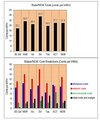Lawnchair Larry
Cancelled
- Apr 1, 2015
- 2,627
- 3,098
- AFL Club
- Port Adelaide
I'm not totally against selective privatisation (eg Qantas), even if that is a poor outcome.
What I am against is the privatisation of utilities.
The provision of energy, in particular, rattles my cage.
It's a dog's dinner and coordinating that industry for the benefit of the populace must be like herding cats.
We have:
a. Raw energy suppliers eg Santos
b. Raw energy suppliers who market to residents eg Alinta, AGL
c. Middle men who buy energy and on-sell to residents
d. Companies who own poles and wires eg SA Power Networks
e. Supply of gas vs supply of electricity to residences
If there are more options or I have misrepresented the maelstrom of confusion then please feel free to correct.
Coupled with all of this is a lingering perception (unproven) that traditional energy sources are in a death spiral, and that companies are wringing all they can from the decaying carcass before its final demise to dust.
The government can place a cap on gas prices all they like (which I believe flows through to energy generation using coal), and you can try your hardest to limit usage, only to find that you butt up against the formidable supply charge.
Admittedly this is somewhat aged data from 2020-2021, but it gives the flavour of how energy is broken down by state. It depicts the state of the electricity market (NEM; National Electricity Market- Eastern States, Tasmania). The network costs dominate, particularly so in SA.
It's about time someone investigated network costs in detail to assess whether this is a rort.

I also took a look at the spot price of LNG, Asia to see what it is doing. Prices have tumbled (US $; 1mmBTU = 1.055GJ), but what I have read suggests that in the period of highly elevated prices companies contracted up in fear that prices would rise even further. We are paying for that now, but I must say it was potentially a lose-lose situation. Not doing so would have been criticised if prices rose further, while doing so with diminishing prices has generated the current situation.

What I am against is the privatisation of utilities.
The provision of energy, in particular, rattles my cage.
It's a dog's dinner and coordinating that industry for the benefit of the populace must be like herding cats.
We have:
a. Raw energy suppliers eg Santos
b. Raw energy suppliers who market to residents eg Alinta, AGL
c. Middle men who buy energy and on-sell to residents
d. Companies who own poles and wires eg SA Power Networks
e. Supply of gas vs supply of electricity to residences
If there are more options or I have misrepresented the maelstrom of confusion then please feel free to correct.
Coupled with all of this is a lingering perception (unproven) that traditional energy sources are in a death spiral, and that companies are wringing all they can from the decaying carcass before its final demise to dust.
The government can place a cap on gas prices all they like (which I believe flows through to energy generation using coal), and you can try your hardest to limit usage, only to find that you butt up against the formidable supply charge.
Admittedly this is somewhat aged data from 2020-2021, but it gives the flavour of how energy is broken down by state. It depicts the state of the electricity market (NEM; National Electricity Market- Eastern States, Tasmania). The network costs dominate, particularly so in SA.
It's about time someone investigated network costs in detail to assess whether this is a rort.

I also took a look at the spot price of LNG, Asia to see what it is doing. Prices have tumbled (US $; 1mmBTU = 1.055GJ), but what I have read suggests that in the period of highly elevated prices companies contracted up in fear that prices would rise even further. We are paying for that now, but I must say it was potentially a lose-lose situation. Not doing so would have been criticised if prices rose further, while doing so with diminishing prices has generated the current situation.



